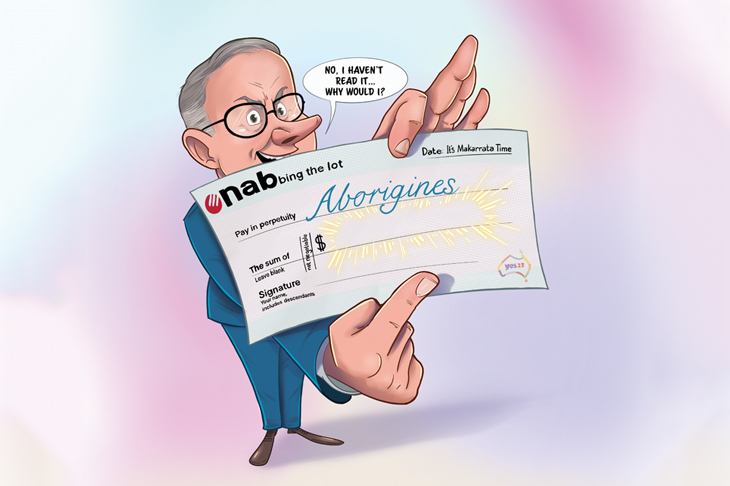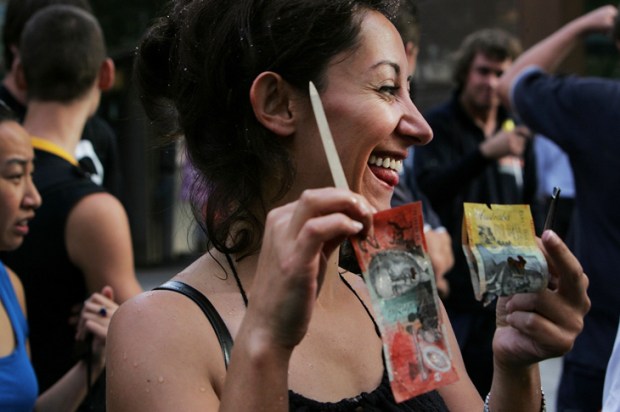During his election victory speech, Prime Minister Anthony Albanese committed his government to deliver, in full, the Uluru Statement from the Heart, which includes the Makaratta Commission reforms of voice, treaty and truth.
Over the past month this has come to haunt the PM. He has repeatedly dodged questions about his commitment to treaty negotiations given the free fall in public support for Canberra’s Indigenous Voice to Parliament proposal.
With Australians confused about precisely what the PM’s position is, fortunately the University of Melbourne has devised just the program to help illuminate the treaty process for us. In fact, for the low, low price of just $7,576.00, you could be the proud recipient of Australia’s first Professional Certificate in Treaty.
The Preparing for Treaty program is run out of the University’s ‘The Australian Centre’ in its Faculty of Arts. It distils the complexities of treaty into just five short courses. Melbourne University’s MicroCerts can turn anyone into a treaty expert, furnishing them with today’s most powerful licence – a licence to virtue-signal!
Here you will learn, ‘Understanding Treaty’, and ‘Indigenous and other Sovereignties’. You will interrogate ‘Lawful relations with Indigenous peoples’ and ‘Recognition, reconciliation, refusal’, and all this will culminate in a study of ‘Indigenous Governance Principles’.
Credit where credit is due; the University of Melbourne is striking while the iron is hot, ensuring it will not miss out on its slice of the Voice to Parliament pie. It is woke capitalism in all its vacuous glory, where symbolic grandstanding and profit-seeking meet.
Such courses are just one small component of the ‘grievance industry’ built around government funding of First Nations’ programs. Australian state and federal governments spend $100 million per day on indigenous affairs. The problem is these funds rarely find their way to the people on the ground experiencing acute disadvantage. They do, however, find their way to universities or, at least, universities have become adept at finding their way to this revenue.
Activism on indigenous issues has been entrenched in the education sector for some time. In 2022, a research report from the Institute of Public Affairs reviewed 791 history subjects offered across 35 Australian universities and found indigenous issues was the second most common theme. More history subjects addressed the issue of ‘race’ than ‘democracy’. The University of Melbourne is a case in point, having come out in support of the Voice while actively promoting treaty and truth telling in its Preparing for Treaty program.
Tertiary institutions that adopt an ideological mantra as an institutional goal are in clear conflict with the principles of free inquiry. Melbourne University Professor Holly Lawford Smith highlighted this point in an article published earlier this year. She said, ‘As universities try desperately to serve two masters (knowledge production; diversity and inclusion), they will increasingly end up sanctioning speech that should be protected.’
Make no mistake, the activist class is working to ensure treaty and truth are foisted on Australia. Victoria and other jurisdictions are already engaged in the early stages of treaty negotiations. The University of Melbourne has jumped on the bandwagon and the PM, despite his recent caginess on the subject, has previously acknowledged that the Voice is only a first step towards treaty and truth-telling. ‘When we go into those discussions with the government about proposal for voice, we want to see a number of things,’ the PM said, ‘We want to see a start down the road of truth-telling and treaty.’
It is here the PM and universities fall into the same fundamental trap – the acceptance of the assumption that only ‘voice, treaty and truth’ will provide the best outcomes for race relations in Australia. It is an assumption arrived at with little rigorous analysis of how this pathway compares with alternative options. Moreover, this unqualified acceptance flies in the face of democratic principles and of the core purpose of universities which is to encourage debate and the contest of ideas in the public square.
Just look at the academics at The Australian Centre, its director, Professor Sarah Maddison’s bio. states her interests include ‘rethinking political relationships between Indigenous and non-Indigenous people’. Dr Matthew Campbell’s work looks at how epistemics, politics and ethics can ‘address the ongoing legacy of colonisation in Australia’. Dr Julia Hurst identifies as a stolen generation descendant and is interested in ‘the role of truth-telling in relation to treaty’. It is groupthink writ large, something increasingly seen across almost all our major institutions. Universities, businesses and media alike have been captured by left-wing ideologies. Activist lobby groups have been all too successful in pressuring organisations to support the fashionable social justice narratives.
Universities are avid recipients of government indigenous affairs largesse. Just last month the Universities Accord Interim Report guaranteed Commonwealth-funded places at university for all academically qualified indigenous students and abolished the 50 per cent pass rule. This decision will lift funding to universities under the guise of helping disadvantaged students. Thus, Australia’s tertiary sector is an increasingly compliant propaganda outlet for the government. This should come as no surprise given their heavy dependence on government funding. The age-old adage, ‘follow the money’, remains true.
A licence to virtue-signal is a licence to pretend to be something you are not. It is counterfeit virtue. It highlights the emptiness at the heart of many modern initiatives which, despite sleek marketing, produce little of value for their target group. A slightly modified version of Margaret Thatcher’s famous quote says it best: ‘Being powerful (or virtuous as it is in this case) is like being a lady. If you have to tell people you are, you aren’t.’
Universities that busily virtue-signal are likely neglecting their core mission, which is to educate. The same is true of business, media and government. Rather than mouthing platitudes and ignoring their responsibilities to customers, taxpayers and shareholders, these elites should focus on securing real and measurable outcomes for those in genuine need.
Got something to add? Join the discussion and comment below.
Get 10 issues for just $10
Subscribe to The Spectator Australia today for the next 10 magazine issues, plus full online access, for just $10.
Brianna McKee is a Research Fellow at the Institute of Public Affairs.
You might disagree with half of it, but you’ll enjoy reading all of it. Try your first month for free, then just $2 a week for the remainder of your first year.














Comments
Don't miss out
Join the conversation with other Spectator Australia readers. Subscribe to leave a comment.
SUBSCRIBEAlready a subscriber? Log in